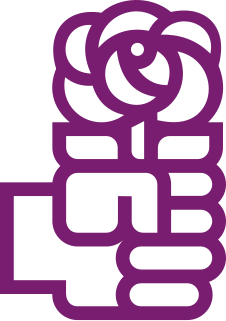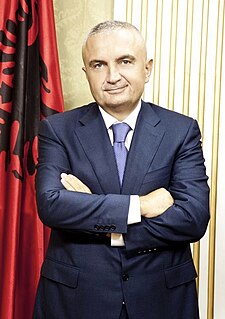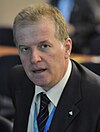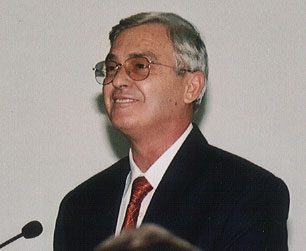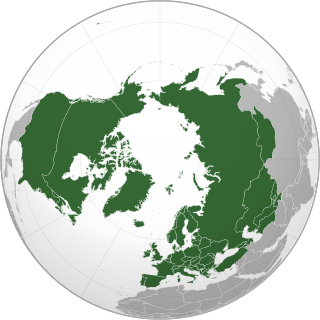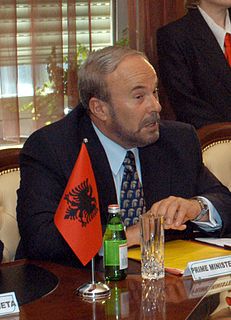
Fatos Thanas Nanolisten (help·info) is an Albanian socialist politician who was the Prime Minister of Albania several times; he was the first leader and founder of the Socialist Party of Albania and a member of the Albanian Parliament from 1991 to 1996 and 1997 to 2009. He reformed the Anti-Revisionist Marxist-Leninist ideology of the Labor Party of Albania into social democracy for its successor, the Socialist Party. During his leadership, the Socialist Party, as a result of reforms, joined the Socialist International and Party of European Socialists. Nano was a candidate in the 2007 presidential election but did not win. He again tried in the 2012 presidential election, but he did not even qualify as a candidate, because the leaders of parties in Parliament obstructed their respective MPs to elect him as candidate in the elections.
The Democratic Alliance Party is a liberal political party in Albania. The party was formed in 1992 by Neritan Ceka and other dissidents of the Democratic Party of Albania. They opposed the leadership of the party's leader Sali Berisha. The Democratic Alliance Party became part of a socialist led government in 1997. In the June 2001 elections it received 2.4% of the vote and three members of parliament. The party continued in government. In the elections in July 2005 it won 3 seats in Parliament.
Parliamentary elections were held in Albania on 3 July 2005. The result was a victory for the opposition Democratic Party (PD) and its allies, prominently the Republican Party (PR). Former president Sali Berisha became prime minister as a result of the election. Voter turnout was only 48.0%.

Constitutional Assembly elections were held in the newly independent Republic of Montenegro on 10 September 2006. Prime Minister Milo Đukanović's Coalition for a European Montenegro, at whose core was the Democratic Party of Socialists, won 39 seats in the 81 seat parliament with the vote near fully counted. The opposition blocs together received 34 seats. There were 484,430 eligible voters.
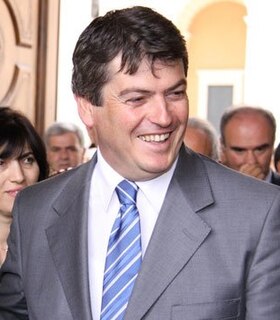
Indirect presidential elections were held in Albania on 20 and 27 June, 8, 11, 14, and 20 July, the sixth such elections since the collapse of the communist regime in 1991.

Bamir Myrteza Topi is an Albanian diplomat and politician. He served as President of Albania from 2007 to 2012.

The 2002 Algerian Legislative election was held in Algeria on 30 May 2002 to elect members of the People's National Assembly. The governing National Liberation Front (FLN) won a majority of seats in the election. The election suffered from a low turnout, violence and boycotts by some opposition parties.

The fall of Communism in Albania, the last such event in Europe outside the USSR, started in earnest on December 1990 with student demonstrations in the capital, Tirana, although protests had begun earlier that year in other cities. The Central Committee of the communist Party of Labour of Albania allowed political pluralism on 11 December and the largest opposition party, the Democratic Party, was founded the next day. March 1991 elections left the Party of Labour in power, but a general strike and urban opposition led to the formation of a "stability government" that included non-communists. Albania's former communists were routed in elections in March 1992 amid economic collapse and social unrest, with the Democratic Party winning most seats and its party head, Sali Berisha, becoming president.
In 1991, the Socialist Party of Albania, with specific social democratic ideology took control of the country through democratic elections. One year later the Democratic Party of Albania won the new elections. After 1990, Albania has been seeking a closer relationship with the West. What followed were deliberate programs of economic and democratic reform, but Albanian inexperience with capitalism led to the proliferation of pyramid schemes – which were not banned due to the corruption of the government. Chaos in late 1996 to early 1997, as a result of the collapse of these pyramid schemes, alarmed the world and prompted the influx of international peacekeeping forces. In 1995, Albania was accepted into the Council of Europe and requested membership in NATO and is a potential candidate country for accession to the European Union. The workforce of Albania has continued to emigrate to Western countries, especially Greece and Italy.
Early parliamentary elections were held in Albania on 29 June 1997 alongside a simultaneous referendum on restoring the monarchy, with a second round of voting for 32 seats on 6 July. The elections were called as a response to the 1997 Pyramid Crisis. The result was an overwhelming victory for the opposition Socialist Party of Albania, which won 101 of the 151 seats. Voter turnout was 72.6%.
A referendum on restoring the monarchy was held in Albania on 29 June 1997 alongside parliamentary elections. Officially the proposal was rejected by 66.7% of voters, although Crown Prince Leka claimed that 65.7% voted in favour.
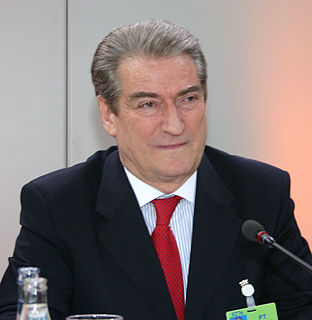
The Albanian local elections of 2011 took place on 8 May 2011 in Albania. Electors were asked to elect their municipality's mayor, municipal council members, municipal unit mayor, and municipal unit members. The elections were administrated by the Central Election Commission of Albania. Only 9 of the 384 winning candidates were women.
Parliamentary elections were held in Albania on 22 March 1992, with a second round of voting for eleven seats on 29 March. The result was a victory for the opposition Democratic Party of Albania, which won 92 of the 140 seats. After the election Aleksandër Meksi became Prime Minister and Sali Berisha became President.
Parliamentary elections were held in Albania on 26 May 1996, with a second round of voting for 25 seats on 2 June. The result was a victory for the ruling Democratic Party of Albania, which won 122 of the 140 seats. Voter turnout was 89.1%.
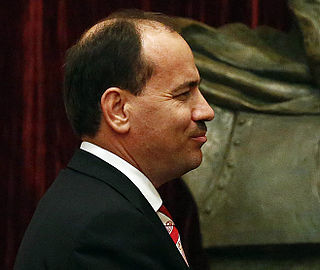
Indirect presidential elections were held in Albania on 30 May, 4, 8 and 11 June 2012. the seventh such elections since the collapse of the communist regime in 1991. The first through third rounds of voting were inconclusive. The fourth round resulted in the incumbent party's member Bujar Nishani being elected as President.

Parliamentary elections were held in Albania on 23 June 2013. The result was a victory for the Alliance for a European Albania led by the Socialist Party and its leader, Edi Rama. Incumbent Prime Minister Sali Berisha of the Democratic Party-led Alliance for Employment, Prosperity and Integration conceded defeat on 26 June, widely viewed as a sign of growing democratic maturity in Albania.
The following lists events that happened during 2009 in Republic of Albania.

Parliamentary elections were held in Albania on 25 June. They were first scheduled for 18 June, but after a possible boycott was announced by the opposition parties, during a large political crisis that lasted 3 months, an agreement was reached between all the political parties on 18 May to change the date. On 28 June, the central election council announced that Socialist party had won a majority.


